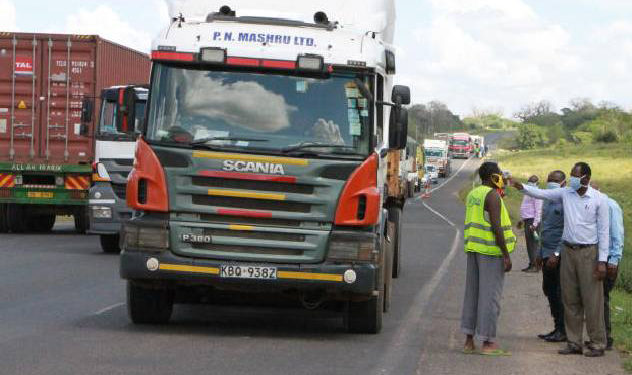The government has set up 14 testing facilities along the major highways used by truckers to fast track testing in the wake of the new directives it has issued to tackle Covid 19 at border entry points and neighbouring countries.
All truck drivers loading cargo from Mombasa port will be tested in Mombasa at Miritini. In Nairobi, a testing facility has been established in South B and in Kisumu, tests will be carried out at Ahero Sub-county Hospital.
Other designated areas include Migori County Hospital, Eldoret, Nakuru Provincial Hospital and Naivasha, Kilifi Medical and Training College, Machakos, Marsabit, Kwale Sub-county hospital, Kinango and Msambweni, the Director of Public Health Francis Kuria said.
“We will continue setting up more centres as we go along so that all the truck drivers get tested either before they start their journey or along the way, since not all the long distance cargo trucks start from Mombasa. Some begin their journey from Kisumu,” said Kuria.
The government has also set up designated stop centres at Busia, Gilgil, Taveta, Namanga, Mlolongo, Malaba and Webuye, where the drivers will spent the night.
“You shall not use any other facility,” said Kuria. “Apart from the said stops, there will be no other stopovers.”
For Covid-19 certificate check, truckers will be stopped at Lunga Lunga, Taveta, Namanga, Busia, Moyale and Isebania.
This new measures were announced yesterday when the government released other guidelines for truck drivers that will make testing for Covid-19 and self-quarantine mandatory during their journeys in the region.
All truck drivers and crew, henceforth, are supposed to stay in designated hotels and guesthouses, and not any other facility of choice.
All truckers are required to be tested at least 48 hours before they begin the journey. Once tested, the results will be sent to the Ministry of Health, which prints a certificate indicating that one is Covid-19 free and allowed to start their journey.
This, according to Kuria, will not stop samples being taken by the health officers along the way to be tested again. This is to prevent a scenario where a Covid-19 free driver may be infected along the way.
“So, along the way you can still be stopped and tested, and once we get the results, we will have to stop you again,” he said.
There are over 25,000 drivers operating along the corridor. Since the government announced plans for mandatory tests, Kenya Transporters Association (KTA) has raised concern on how long the tests would be carried out so that they are able to plan their trips with the drivers.
“Centres testing Covid 19 should be enhanced by availing kits and deploying enough medics to conduct the exercise. They should also be done promptly to save transport time,” said KTA chairman Mr Newton Wang’oo in a statement, adding that authorities in Kenya should also liaise with other regional states to ensure that the certificate is recognized there as well during its period of validity.
The transporter said that a collaborative testing measures between Kenya and Uganda would eradicate harassment stigmatization from citizenry of other member countries.
“It is our wish that the spirit of East Africa citizenship will prevail for our drivers to feel they are at home wherever they are in the East Africa region and it’s neighbourhood to enable effective cargo delivery to the various destinations,” Mr Wang’oo said.
It is now taking four days for a truck to move goods from Mombasa to Malaba up from two days due to delays caused by measures to contain the Coronavirus pandemic, an assessment by a regional transport authority shows.
For any feedback, contacts us via editorial@feaffa.com / info@feaffa.com; Mobile: +254703971679 / +254733780240




